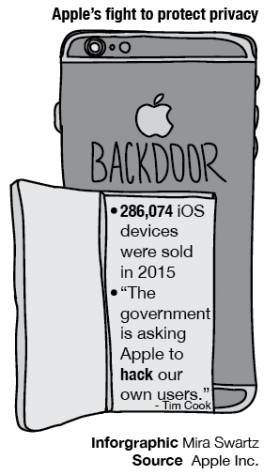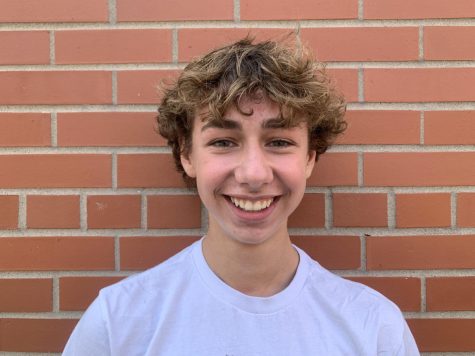Apple’s refusal to hack iPhone protects user security
FBI wrongly ordered technology giant to invade privacy
March 16, 2016
The FBI crossed a serious line in terms of consumer privacy when they asked Apple to unlock the iPhones of two suspected terrorists.
By telling Apple to create software to extract data from personally locked iPhones, the FBI sets a dangerous precedent for digital security. The order, sent Feb. 16, crosses a line regarding individual privacy.
The terrorists in question, Syed Rizwan Farook and Tashfeen Malik, allegedly opened fire and attempted a bombing at a holiday party in San Bernardino, California, Dec. 2, 2015, killing 14 and injuring 24 before they were killed by police.
The FBI wants Apple to code new software to unlock Farook’s iPhone because it wants to know who he communicated with and what he searched leading up to the attack.
This would allow the government to gain access to the private information on iPhones in the future, because once this software is made, it’s out there for good.
In a testimony before the U.S. House Judiciary Committee, Apple’s Senior Vice President and General Counsel Bruce Sewell said that district attorney Cyrus Roberts Vance plans to use this unlocking software to access 175 iPhones from unrelated cases.
Many people carry around some of the most intimate details of their lives on their iPhones, from health and banking information to personal text messages and thousands of photos.
The creation of this software could jeopardize people’s privacy in criminal cases and in ordinary daily life. When in the wrong hands, this software could be used by practically anyone to crack into an iPhone and extract secure information.
Someone with access to this program could see any information stored on a device without the owner’s permission.
Apple’s resistance in this case doesn’t indicate that it does not cooperate with law enforcement. Apple already aided the FBI by providing important information such as the iCloud backups from Farook’s iPhone.
Asking Apple to go as far as unlocking the phone, giving access to the information not included on the iCloud backups, will cause damage in the future.
Apple has simply drawn a line to protect the personal safety and security of millions of people who own iPhones.













